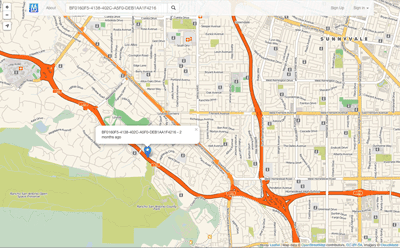IP2Location web service providing a service to do a reverse lookup of an IP address to an ISO3166 country code, region or state, city, latitude and longitude, ZIP/Postal code, time zone, Internet Service Provider (ISP) or company name, domain name, net speed, area code, weather station code, weather station name, mobile country code (MCC), mobile network code (MNC) and carrier brand, elevation, usage type, address type and IAB category. There are also 7 categories of additional add-on response fields supported such as metro, olson time zone, translations and more. Refer to https://www.ip2location.com/web-service/ip2location for further information.
IP2Proxy allows instant detection of anonymous proxy, VPN, TOR exit nodes, search engine robots (SES), data center ranges (PX2-PX10), residential proxies (PX10) and VPN provider name (PX11) by IP address. It also returns the threat type of the proxy (PX9 or higher). Visit https://www.ip2location.com/web-service/ip2proxy for further information.
The GeoDB API focuses on getting global city and region data. Easily obtain country, region, and city data for use in your apps!
- Filter cities by name prefix, country, location, time-zone, and even minimum population.
- Sort cities by name, country code, elevation, and population - or any combination of these.
- Get all country regions.
- Get all cities in a given region.
- Display results in multiple languages.
- RESTful API adheres to industry best-practices, including HATEOAS-style links to facilitate paging results.
- Backed by cloud-based load-balanced infrastructure for resiliency and performance!
- Data is periodically refreshed from GeoNames and WikiData.
Notes:
- Since the database is periodically updated, this may very rarely result in certain cities being marked deleted (e.g., duplicates removed). By default, endpoints returning city data will exclude cities marked deleted. However, in the unlikely event that this occurs while your app is paging through a set of affected results - and you care about the paged results suddenly changing underneath - specify includeDeleted=SINCE_YESTERDAY (or SINCE_LAST_WEEK if you're really paranoid!).
Useful Resources
The Miataru API is very simple and straight forward. Generally you're posting (HTTP POST) a JSON formatted request to a service method locations and you get back a JSON formatted answer. Please take into consideration that this has the request-for-comment status and that it can change while there's work done on client and server applications. Versioning therefore is done by prepending the version number - /v1/ for version 1 - to the method call.
Welcome to the Daymet Single Pixel Extraction Tool API. You can use this API to download daily surface data within the Daymet database in a `csv` or `json` format for a single point. This API allows users to query a single geographic point by latitude and longitude in decimal degrees. A routine is executed that translates the (lon, lat) coordinates into projected Daymet (x,y) Lambert Conformal Coordinates. These coordinates are used to access the Daymet database of daily interpolated surface weather variables. Daily data from the nearest 1 km x 1 km Daymet grid cell are extracted from the database. If you would like to learn how to automate the download of multiple locations for the Daymet Single Pixel Extraction Tool, click [here](https://github.com/ornldaac/daymet-single-pixel-batch).
The API ecotaco allows you to connect, create an account, manage your credit cards and order rides. # Authentication Ecotaco API use a system of application key and authentification token. ## Application key : The application key is generated by Ecota.co and unique to an application. Before accessing EcoTa.co APIs, you need to register your application. Please supply the following information to dev@ecota.co: - Application name - Company (if appropriate) - Contact name, phone and address - Contact email - Is this a web application, a desktop application, or an application running on a device? - Short description of your application It **must** be passed on request : "accounts -> login", "accounts -> facebook login" and "accounts -> register" . ## Authentification token : The authentification token is retrieved at login or register of an user. It **must** be passed in request for authenticate action in Authorization HTTP header. Example : Authorization: Token token=e55887022c1aca4c86abcc49e85ceb8a0c855d2af4d9fac75c08040a583dcde4 # Language On some of our resources, we filter the content displayed based on the Accept-Language header. If the language is not defined or if we don't use the language defined in this header, we automatically use French as the default language. EcoTa.co currently support two languages: English, French. ("en" and "fr") # Encoding All requests and answers on EcoTa.co are in UTF-8.
The Maps API web services suite offers the following APIs: - Raster The Maps Raster API renders map data that is divided into gridded sections called tiles. Tiles are square images (png or jpg format) in various sizes which are available at 19 different zoom levels, ranging from 0 to 20. For zoom level 0, the entire earth is displayed on one single tile, while at zoom level 20, the world is divided into 240 tiles. - Vector Similar to Maps Raster API, the Maps Vector API serves data on different zoom level ranging from 0 to 22. For zoom level 0, the entire earth is displayed on one single tile, while at zoom level 22, the world is divided into 244 tiles. The Maps Vector Service delivers geographic map data packaged in a vector representation of squared sections called vector tiles. Each tile includes pre-defined collections of map features (points, lines, road shapes, water polygons, building footprints, ect.) delivered in one of the specified vector formats. Format of the tile is formally described using protobuf schema.
Routing consists of the following service: Calculate Route Calculates a route between an origin and a destination, passing through waypoints (if specified). Additional routing parameters like traffic, avoidance conditions, departure/arrival time etc. can be taken into account. Calculate Reachable Range Calculates a set of locations that can be reached from the origin point, subject to the available fuel or energy budget that is specified in the request.











